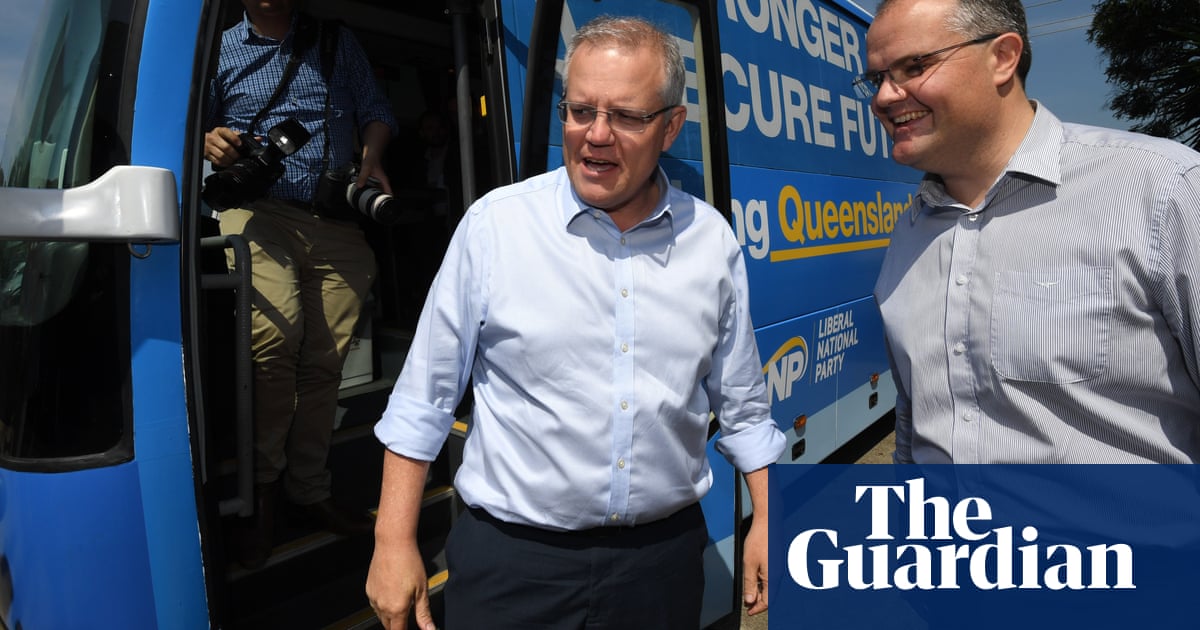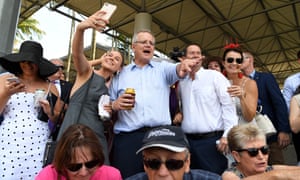
[ad_1]
As Scott Morrison’s “Sco-mobile” ghost bus has made its way northward, so too have the Coalition’s hopes of retaining crucial electorates.
LNP sources confirm Morrison’s elevation to prime minister alone has put Queensland “back in play”, with early internal polling showing marginal electorates all but written off by the government under Malcolm Turnbull’s tenure as prime minister once again considered “competitive”.
Morrison’s four-day tour of Queensland, from the south-east to Townsville, has been seen as the start of the pseudo election campaign, with the north crucial to any chance the government has of remaining in power, or “at the very least, keeping a loss to something potentially overcome in an election cycle, rather than a generation”.
With the southern states all but being dismissed by Coalition sources as a “zero sum game” come polling day, the fictional “Brisbane line” has taken on new meaning, as the Morrison government concentrates on Queensland and Western Australia as its potential keys to victory.
Party sources have reported a “reinvigoration” in Queensland following Morrison’s elevation to prime minister but no one was willing to go as far as to say it was a game-changer.
“We don’t know if it’s him, or just that it’s not Malcolm,” one party source told Guardian Australia. “But we know that people are prepared to listen again, and that is more than we could say in June.”
The Coalition holds 21 of Queensland’s 30 seats, with the state key to the 2016 election win. Under Turnbull, the Coalition won 49% of NSW’s seats, 46% of Victoria, 36% of South Australia and nothing in Tasmania.
But in Western Australia, the Liberals claimed 69% of seats, beaten only by Queensland where the LNP won 70%, which, at the time, gave the government a one-seat majority.
The Wentworth byelection loss has seen the Morrison government lose that majority and it now must govern with the support of the crossbench.
Labor has not been shy in declaring its intention to seriously challenge for at least a dozen of the seats held by the LNP, where the Coalition is officially one party.
Four months ago, party sources had conceded holding at least six of those seats, including Dawson, Forde, Petrie, Capricornia, Flynn and Dickson, was looking like a challenge.
“It is still going to be tough but we are off to a better start this election campaign under Morrison, at least so far,” another party source said. “I can tell you that, internally, we know that Morrison is better for us in those seats than Turnbull was.”

Scott Morrison watches the Melbourne Cup main race at the Corbould Park racecourse on the Sunshine Coast on Tuesday. Photograph: Dan Peled/AAP
That comes as no surprise, as Queensland MPs, led by Peter Dutton, and backed by the state party executive, were at the forefront of the push to remove Turnbull from office, a move that proved only half-successful, when Morrison snatched the party room numbers when it became clear Dutton did not have enough support.
Morrison may not be popular in the rest of the country but in Queensland he is considered more popular than Turnbull and, for the moment, that is considered enough.
But that is not to say the LNP is feeling confident.
Katter’s Australian party, having dealt with the issue of Fraser Anning by removing him from the party, has indicated it will make a serious play for two Queensland seats, Leichardt, held by the LNP’s Warren Entsch, and Herbert, held, just, by Labor’s Cathy O’Toole.
KAP preferences in those seats, along with Clive Palmer’s reincarnated political push, in the north Queensland seat of Herbert, are likely to prove crucial.
Preliminary reports from the north of the state show Leichardt to be “fairly safe” as long as Entsch remains the candidate.
“The moment Warren goes, that seat goes,” a LNP source said. “He’s the key. Same sort of thing as Bonner [a Brisbane eastern suburbs seat held by the LNP’s Ross Vasta since 2010], where a good local candidate makes all the difference.
“Looking at it at the moment though, you could see a couple of three-way contests up north, where one of the majors gets bumped by a minor party and, at this stage, I don’t think anyone could say if it would be Labor or us who came out on top.”
Dawson, held by George Christensen, is considered to be safe as “Georgie doesn’t really give voters up there a reason to turn to One Nation, there’s not a lot separating him”, while Flynn, held by Ken O’Dowd, is considered “lineball”.
A surprise worry is the inner city seat of Brisbane, held by Trevor Evans, where Andrew Bartlett is standing as the Greens candidate in an electorate showing a strong green tinge. In the last election, Labor received its lowest primary vote in the seat since Federation, as voters turned to the minor party, which has seen a growing influence in the state and last year elected its first state MP.
But once again, the Pauline Hanson effect looms large, its shadow chasing Morrison’s government plane, and bus, up the state’s major highways, as he makes stops in central and northern towns considered most primed for her message.
“And that is what makes it so unpredictable,” another LNP source, familiar with campaign plans said. “Hanson attracted about 20% of the Longman vote while floating off the coast of Ireland. She doesn’t even have to be there, people just look for her name. So while Morrison is a better foil than Turnbull for that, who knows what impact that will ultimately have.”
Source link